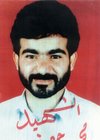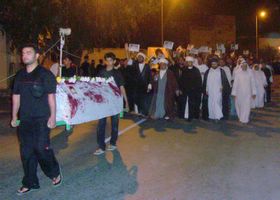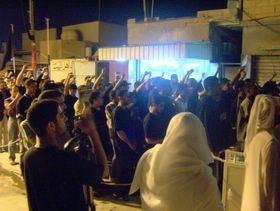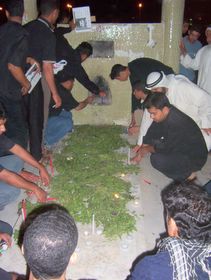Black Saturday
Friday, April 01, 2005

From the Voice of Bahrain website:
On Saturday 1 April 1995 at 3.00 am, the village of Bani Jamra (where Sheikh Al-Jamri [a leading opposition figure during the 1990s uprising in Bahrain] resides) was encircled by thousands of paramilitary forces. The neighbours of Sheikh Al-Jamri (around six to eight of them) were ordered to evacuate their houses within minutes or be sprayed with gunfire. The next neighbour (Mr Omran Hussain Omran) has had his two daughters injured, one of them in critical condition as a result of a bullet in the head. The husband of the latter, Mohammed Jaafer Yousif Atteya, 30 years old, was shot dead by a machine-gun. Later, the neighbours demonstrated, more were shot and up to fifty were injured. One of them already passed away, Mr. Mohammed Ali Abdul Razzaq, a 50 years old carpenter, who rushed to save his injured son, Asaad, but found himself the target of machine guns. The funeral of the two was prevented and only a handful of relatives were allowed in the cemetery for the last farewell.
This day was henceforth known as Black Saturday, and today marks the 10 year anniversary of this sad event.

Last night a group of around 300 Bani Jamra residents and activists from around Bahrain held a demonstration in the village to commemorate the event. The purpose of this was to mourn the dead (Mohammed Ali Abdul Razzaq and Mohammed Jaafer Yousif Atteya), to pass on the story to the next generation of Bani Jamra residents and Bahrainis, and to renew the call for the criminals to be brought to justice.

It has been ten years since the original Black Saturday, yet the government has refused to talk about (let alone admit the possibility of error) what happened during the early hours of that day. The government refuses to talk about any of the accusations of torture and murder that activists have laid against it. Instead, in 2002 the King issued Royal Decree 56 which grants amnesty to anyone accused of crimes affecting national security committed before 2001.

While I commend some of the attempts at political reform taken by the ruling regime since 2001, it has to realize that there is no way to avoid truth and reconciliation. It's all well to look to the future, but the mistakes of the past have to be admitted so that the people can be confident that they will not be committed again. Until then, the dark memories and anger against the regime will continue to fester, as was demonstrated last night when a section of the crowd broke into impromptu chants of "Death to Al-Khalifa". I hope that one day in the future, members of the regime might even participate in the Black Saturday commemorations themselves. But right now their silence on the issue maintains the deep divide that exists between the rulers and the people. I thought this photo illustrates the current situation well:

It was taken during a recent symposium about discrimination in Bahrain. The chair was placed on the platform next to all of the speakers, but remained empty. The sign says "government representative", and the image of the empty seat indicates how the government has refused to engage in any serious dialogue with opposition activists since the reforms of 2001.

Above: Lighting candles around the graves
See also: Repeal 56

4/01/2005 05:43:00 am
Everyday in Bahrain should be a Black Day.
As far as I'm concerned Bahrain is a paradise shat upon by evil barabaric bedouins.
Sometimes I wonder - who was it who picked the phone up and gave order to the forces to do what they did? In the middle of the night - he must've been flipping in bed, depressed, stressed, and worried that his material pleasures were threatened. After the sixth shot of whiskey, it occured him that killing them would rid him of his worries. Then the phone call was made.